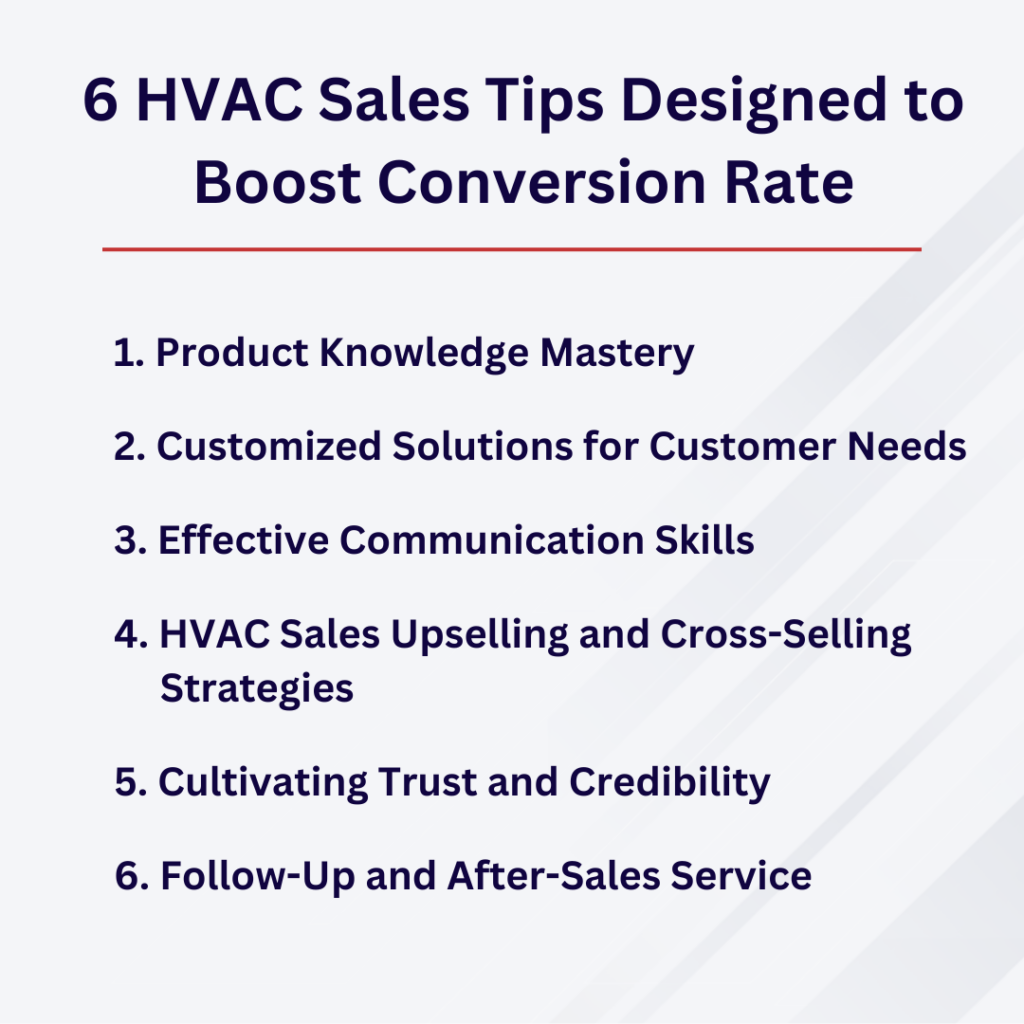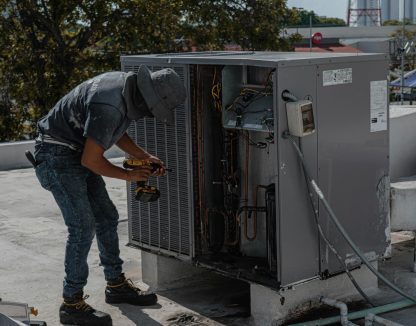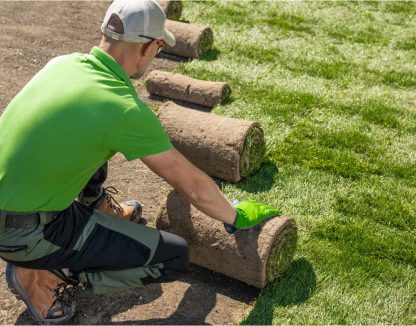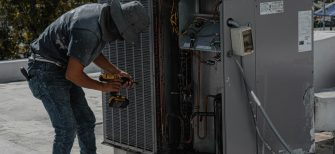In the dynamic world of heating, ventilation, and air conditioning (HVAC) services, mastering the art of sales is pivotal for business growth and success. Whether you’re a seasoned professional or a novice in the industry, implementing targeted strategies can significantly increase your HVAC business conversion rates. This comprehensive guide will delve into actionable HVAC sales tips, examples of compelling sales pitches, and strategies to streamline the sales process for optimal results.
Understanding the HVAC Sales Process
The HVAC sales process encompasses several stages, each crucial for converting leads into loyal customers:
Lead Generation: Explore diverse channels, including social media, referrals, and networking, to attract potential customers. Where are your target customers? How do you think it makes sense to find them?
Initial Contact: Make a lasting impression during the first interaction, whether it’s through a phone call or a face-to-face meeting. Establish rapport and demonstrate attentive listening to understand your customers’ needs.
Assessment and Proposal: Conduct a thorough assessment of the HVAC system and present a tailored proposal that addresses specific customer requirements. Using professional HVAC proposal software can create a lasting impression on your customer and help you close the deal.
Closing the Deal: Effectively communicate the value proposition and address any concerns to successfully close the sale. You can also utilize tools such as HVAC customer financing to help you close the deal. Giving your customers more ways to say yes increases your chances of getting the sale!
Ready to Learn More?
HVAC Sales Tips for Enhanced Conversion Rates
1. Product Knowledge Mastery
A comprehensive understanding of HVAC systems, services, and the latest industry trends is foundational. Being well-versed in energy-efficient solutions and diverse product offerings can instill confidence in potential customers.
2. Customized Solutions for Customer Needs
Avoid a one-size-fits-all approach. Tailor solutions to align with each customer’s unique requirements. Highlight how your services cater to their specific needs, be it energy efficiency improvements or enhanced indoor air quality. As you develop relationships with existing customers take detailed notes of their priorities, pain points, and lifestyle. Then, you can utilize these notes to provide customized and thoughtful solutions.
You can show these solutions on customized proposal comparisons, giving the customer more than one quote. That way, they avoid the need to call other companies for quotes and instead, get anywhere from 1-6 from you, increasing your conversion rate. Use HVAC proposal software to help you create these professional proposal comparisons.
3. Effective Communication Skills
Effective communication is pivotal for HVAC companies. Master the art of active listening to comprehend customer pain points thoroughly. Clear and concise communication about the benefits of your services helps build trust and credibility between you and the homeowner.
Once you are on the job, continuing to communicate with your customer is key. Send an ‘on my way’ text notification to let them know you will be arriving soon. Running late? Shoot a quick message so they know exactly when to expect you.

4. HVAC Sales Upselling and Cross-Selling Strategies
Seize opportunities to upsell or cross-sell additional services or products. For instance, when installing a new HVAC system, recommend regular maintenance plans or air quality enhancements. Emphasize these offerings as value-adds that benefit the customer.
Using HVAC maintenance plan software can help you easily create, sell, and manage maintenance plan customers. This customer base not only provides recurring revenue for you now but also becomes a set of leads for future replacement installs.
5. Cultivating Trust and Credibility
Building trust takes time but is indispensable. Showcase testimonials, certifications, and case studies that highlight successful projects. Transparency and honesty in dealings foster long-term relationships.
6. Follow-Up and After-Sales Service
Post-sale follow-ups are potent tools. Ensure customers are satisfied with the service provided and offer ongoing support. Send an automated review request using a system like Payzerware to ensure you ask for reviews on every job. Include links to your favorite review sites such as Facebook, Google, Yelp, and more. This not only enhances customer satisfaction but also opens doors for referrals and repeat business.
Examples of Persuasive HVAC Sales Pitches
So, how do you make sure your HVAC contractors are selling to the best of their ability? Crafting compelling sales pitches can significantly impact conversions with potential customers. Here are two sales script examples to get you started.
Pitch 1: Focusing on Efficiency
“By upgrading to our high-efficiency HVAC system, you’ll not only enjoy a more comfortable home but also witness a remarkable reduction of up to 30% in your energy bills. It’s an investment that pays for itself while contributing to a greener environment.”
Pitch 2: Upselling Maintenance Plans
“Enroll in our annual maintenance plan to extend your AC unit’s lifespan and receive priority service and repair discounts. It’s a small investment ensuring year-round peace of mind.”
Mastering HVAC sales demands a blend of industry expertise, effective communication, and a customer-centric approach. Implementing these strategies into your sales process can significantly elevate conversion rates, foster customer loyalty, and drive business growth within the competitive HVAC market. Continuous learning and adaptation to evolving customer needs remain crucial for staying ahead in the ever-evolving world of HVAC sales.
Frequently Asked Questions
How can I improve my HVAC sales?
Improving your HVAC sales starts with understanding your customers’ unique needs. Enhance your product knowledge, staying updated on industry trends, and technological advancements. Tailor your solutions to address specific customer pain points, emphasizing the benefits of your services. Effective communication is key—listen actively, articulate solutions clearly, and build relationships for long-term success. Identify opportunities for upselling and provide excellent after-sales service to foster trust and encourage referrals.
What makes a good HVAC salesman?
A successful HVAC salesman possesses a diverse skill set. They have in-depth product knowledge and exceptional communication skills, actively listening to understand customer needs and proposing tailored solutions. Adaptability, resilience, and empathy are vital, allowing them to address varied customer concerns and build lasting relationships. Continuous learning and a customer-centric approach define a great HVAC salesman.
How do you build value in HVAC sales?
Building value in HVAC sales involves highlighting the benefits of your services. Focus on the specific advantages your heating and cooling solutions offer. Examples of customer-centric advantages include; energy efficiency, cost savings, improved air quality, and comfort.
Showcase expertise through certifications, testimonials, and successful projects. Educate customers about the importance of maintenance and offer guarantees to instill confidence. Personalize solutions to meet individual needs, demonstrating a commitment to their satisfaction and long-term benefits.







